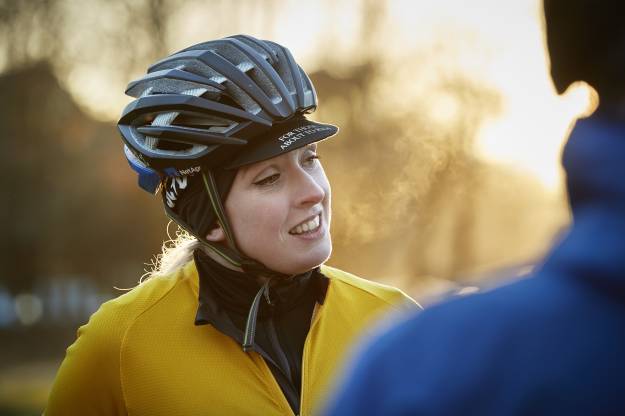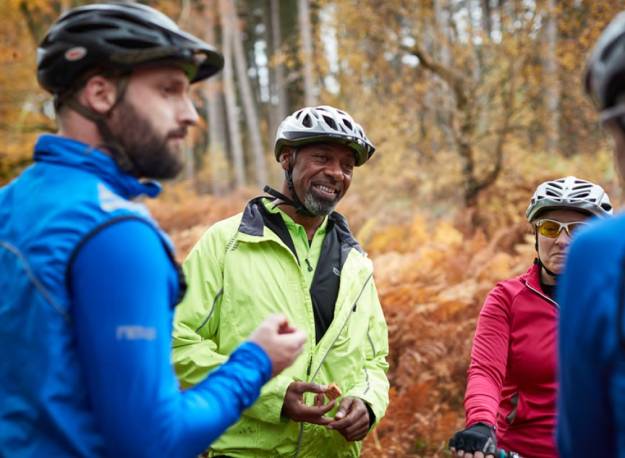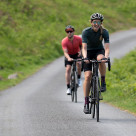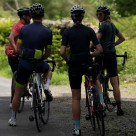Think about the last event you took part in; perhaps it was a race, sportive, jam, time trial or match. Now multiply that experience by 2,446 and that’s how many cycle sport events have either run or are set to take place in 2024. It’s an average of 6.7 every day!
Behind these events are 832 organisers whose commitment and passion are what creates a vibrant, inclusive and innovative calendar of ways to ride. It’s reassuring and a thought-provoking idea that your dedicated training, race-day nerves and post-effort euphoria can all be attributed to someone simply wanting to do something good for the sport. To these people, we owe a lot.
But on event day how many of us actually see the organiser – or are even aware of who they are? In many cases they will be behind the scenes, busy ensuring everything goes to plan and moving around the event checking in with their team of officials and volunteers. We wanted to highlight the role of an event organiser, with three experienced individuals telling their stories to offer a glimpse of what’s involved – and hopefully get you thinking about how you might be able to support cycling in your area.
Meet Lisa, Dave and Tarn
Lisa West is a member of Twickenham CC and has been organising a round of the British Women’s Team Cup (previously the Team Series) since 2008, encouraged by the late Dave Peck who was a passionate supporter of women’s cycling. The Dave Peck Memorial Road Race is now a mainstay of the Team Cup and Lisa oversees the entire series, having taken this on from Jon Miles (winner of the 2023 British Cycling Gold Badge of Honour Award for his contribution to cycling).
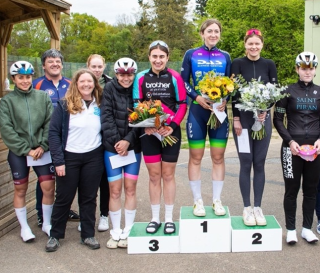
(Lisa on the left in a white shirt)
Dave Haygarth is a cyclo-cross, MTB and originally road race organiser who has organised races on pretty much every level, from grassroots evening fun races to the National Cyclo-cross Championships. Starting out in the 90s as Racing Secretary for Cheltenham & County CC, Dave then learned his craft across evening time-trials, road races and cyclo-cross events. From that experience came bigger events, including a round of the ‘Jo Bruton trophy’ (the then women’s national road series) and his club’s cyclo-cross race grew to become a round of the National Trophy.
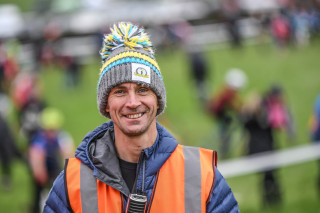
In Scotland, the Scottish Downhill Association (SDA) and Scottish Cyclo-cross (SCX) are two small but strong groups of volunteers who organise the Scottish National Series across the off-road disciplines. Here, Scottish Cycling Events Manager and volunteer, Tarn Fynn, shares his experience.
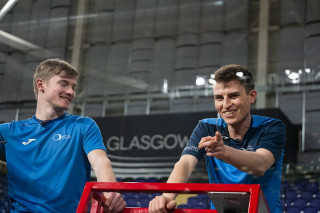
Giving something back
All feel very strongly about creating opportunities for others to ride. Lisa believes it is important as someone who has benefitted and developed her own skills as a rider to give something back to the sport that she loves:
“I wasn’t particularly good at road racing, but the Team Series ethos was to encourage riders of all abilities to improve by racing dropped riders to try and gain a higher finish placing and earn more team points. My small contribution meant we built enough points to finish second overall in 2007 - and it was this ethos that inspired me to encourage other ladies to race in my club in subsequent years.
After stepping back from managing a Twickenham CC Ladies race team and realising how important the British Team Cup is for providing a stepping stone between regional and national racing, I took on the mantle from Jon Miles who had initiated and run the Team Cup Competition for 20 years!”
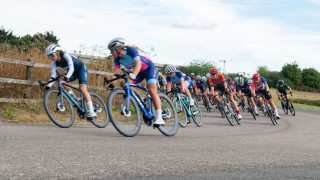
And Dave still remembers the goosebumps he got when his club managed to put on the only round of the cyclo-cross National Trophy the season after Coronavirus had such an impact in 2020:
“It was a bleak time, but there were so many people wanting to help and make it happen - and we did make it happen! That was a moment for me. A core realisation that we’d really created an opportunity for people to race in an otherwise barren calendar.”
“You might be the name on the entry page, but you’re always part of a capable team.”
Support and inspiration can come from any direction, and Dave sings the praises of every single person that gets involved. From his many years of experience, he knows that it takes a village to put on a successful and safe event:
“You never organise a race on your own. It’s always teams of people who help; those to whom you can delegate and know they will deliver – be that the person who stands by the side of a course crossing all day getting soaked in their marshal bib, or the staff at British Cycling who are always on hand to help.”
What does an event organiser do?
Despite its quite literal title, the role of event organiser (here’s the specification on our website) can actually be quite mysterious – and varies significantly between disciplines and types of event. While it’s by no means a one-size-fits-all approach, Lisa’s timeline provides insight into the tasks involved and teamwork required in the planning and delivery of an event:
-
Six - eight months to go: Liaise with British Cycling to agree a date and get your event registered. Check for any roadworks.
-
Once the date is agreed: Confirm the venue, notify the council, book the National Escort Group (NEG), Accredited Marshals, medical cover, timing services and race equipment, and ask clubmates to volunteer.
-
Six weeks to go: Check again for roadworks and log road defects with the council, monitoring these up to event day.
-
Four weeks to go: Actively promote the event, aiming for a full field.
-
Two weeks to go: Confirm volunteers, select riders, produce a race programme, field queries from riders/teams, check in with the Accredited Marshalls organiser and the Race Commissaires. Ride out to check the course and place event notification signs up.
-
One week to go: Oversee race logistics, pick up race equipment, liaise with catering and prepare race expenses.
-
On the day: You did it! It is now a case of overseeing volunteers to carry out assigned roles, such as placing signage, setting up the finish, briefing red flag marshals and convoy drivers.
-
Afterwards: Present the prizes, thank everyone involved and produce the full result for British Cycling. Make sure the event HQ is cleared and that all race signage has been collected.
-
In the following days: Submit the event result and levies to British Cycling, return all race and catering equipment to storage. Breathe a huge sigh of relief.
And Dave describes the process becoming more familiar as annual events repeat and you gain experience:
“It’s easier the more you do. If you organise the same event year after year, you can generally repurpose things like balance sheets, key documents etc. Risk assessments need a review and refresh rather than a total write from scratch. You get to know suppliers for things like loos, food, timing systems etc. so it becomes easier. But starting a new event at a new venue does take more effort. Nothing ever takes place in a vacuum though and there’s always people on hand to help in all sorts of ways if you’re not shy to ask.”
Stand-out events and challenges
When it comes to an event highlight, Dave shares that “organising the National Cyclo-cross Championships in January 2023 would, on paper, be the biggest and most impressive (watch him ride the course). However, for me, the best moment would be my first National Trophy at that venue: Westmorland Country Showground, in Cumbria. It was the first time in about 10 years that the region had its own round and when the whistle went on the first event of the weekend, I had a massive emotional moment. It was properly exhilarating after months of planning to realise it was happening!”
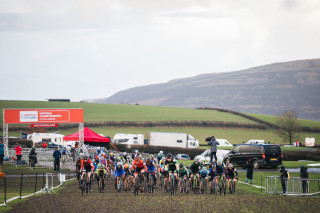
Unavoidably there are of course challenges when it comes to event delivery. Lisa’s main concern for the future sustainability of the sport is shared with many fellow organisers and concerns riders entering late:
“All the Team Cup races have had large fields, but it needs to be investigated to fully understand if anything can be done to improve the confidence of organisers who run the risk of running races at a loss as some of the race costs require payment in advance.”
And for Dave, his worries are on the future of volunteering as “old-style clubs seem to ebb away”:
“We still have some amazing clubs, but the older clubs in our region – the ones that organised their own event each year – are dwindling in numbers, and the facilitators are getting older. I’m also concerned about diversity. So many of our organisers in road racing and cyclo-cross are white, middle-aged, middle-class men (like me!) and I so, so want to see younger people from different backgrounds and genders bringing a new spark into event organising.”
It’s the same picture in Scotland, with Tarn highlighting that “we benefit from having associations that either deliver or support the delivery of Scottish National Series in all off-road disciplines. The BMX Regional Series, SCX, SDA and SXC are all led by a relatively small and incredibly motivated group of volunteers who go above and beyond to deliver multiple national level events each year. It is a huge undertaking for them, and without the direct link to a single club, volunteer recruitment for committee roles and on-the-day support can be extra challenging. There are absolutely opportunities for clubs to engage with the associations and step up and bring their own ideas and concepts to support the racing calendar.”
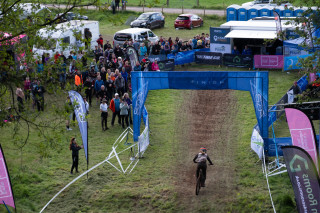
Dave and his regional cyclo-cross association are trying to get new faces to meetings to bring with them new opinions (and perhaps gain the mindset and experience that they might themselves organise something), while Lisa looks to the thriving community around the British Women’s Team Cup and the small team of volunteers that run the series to ensure that it remains relevant and attractive:
“My feedback loop is largely via the British Women’s Team Cup community when I go to the races or through email. We also run an end of year survey to the teams asking what courses they liked or what they would like to change.”
Could you support the sport?
If you see an opportunity locally, want to be part of the succession process for a local race or have an idea for something innovative, Dave and Lisa have a few words of encouragement.
For Lisa it’s all about the people: “It is so rewarding to see the smiles on not only the riders’ faces, but also all the volunteers that have helped you to deliver a fantastic event. Many go away with a twinkle in their eye appreciating they may have seen future stars – after all Dame Laura Kenny, Corrine Hall MBE, Elinor Barker MBE, Hannah and Alice Barnes and Anna Henderson have all raced at my event as part of their development!”
And while it’s no doubt clear from the feeling of community expressed throughout this article, Dave reassures that: “You’re never alone – so don’t suffer in silence. Talk to other organisers, commissaires, British Cycling – there are so many people who are there to help you. You might be the name on the entry page, but you’re always part of a capable team.”
Next steps
If you would like to get involved in organising a race in your area, contact your Regional sport developer and find out more about becoming an event organiser on our website. Existing organisers may also offer the opportunity to shadow them, so do get in touch to have that conversation.
And if you want to keep reading, we recommend this 2023 article about Yomp Bonk Crew, the Sheffield-based young event organisers changing the game of the British road racing scene. Plus they are acknowledged in Volunteers in Focus for their work as part of a wider team organising the 2024 Ronde van Wymeswold.



